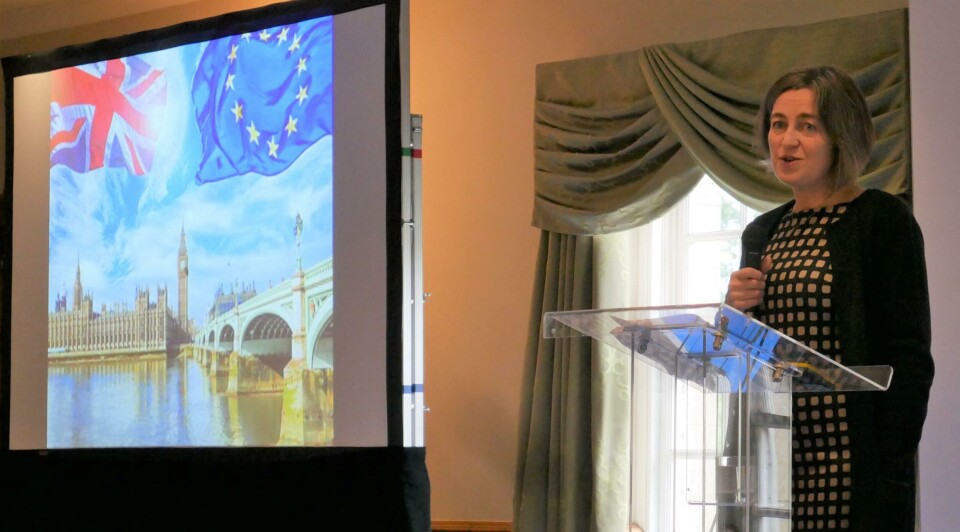
Salmon farmers are given Brexit breathing space
Scottish salmon farmers were breathing a collective sigh of relief today following a decision by EU member countries to grant the UK a flexible extension to Brexit until October 31.
It means the prospect of perishable Scottish seafood being delayed at ports because of a so-called disorderly departure from the EU tomorrow has, at the very least, been postponed for six months.
The UK could still leave before that if MPs pass the Withdrawal Deal that Prime Minister Therese May agreed with the EU but such a departure would avoid the feared immediate disruption to exports of a no-deal exit.
The Scottish Salmon Producers’ Organisation (SSPO) has previously raised concerns about repercussions of a no-deal Brexit for salmon exports and consistently pointed out its desire for continued frictionless trade with the EU.
In January, SSPO chief executive Julie Hesketh-Laird was one of seven CEOs of food and drink organisations to sign an open letter urging politicians to come together to prevent the UK leaving the EU without a deal.
Logistical problems
When asked recently about the impact of a possible no-deal Brexit, Hesketh-Laird told Fish Farming Expert: “The EU is a big market for Scottish salmon and the European appetite for salmon is strong. Brexit shouldn’t impact the EU appetite for the best quality salmon though there are concerns on how we get salmon to consumers.”
But she added: “A hard Brexit would risk problems in the logistics of getting salmon into the rest of Europe. For the hauliers carrying perishable goods such as fresh fish, this is obviously more of a risk than for other carriers.
“There is still confusion over how many certificates will be required, who can issue them and even if there will be a temporary grace period when the certificates won’t be needed.”
Although the United States was the largest single export market for Scottish salmon in 2017, with sales worth £193 million, France, wasn’t far behind with sales worth £188m. Another EU country, the Republic of Ireland, was in fourth place with sales worth £34m.

‘Cancel Brexit altogether’
European Union leaders granted the “flextension” late last night after five hours of talks in Brussels. One condition is that the UK must now hold European elections in May or leave on June 1 without a deal.
European Council president Donald Tusk said afterwards: “The course of action will be entirely in the UK’s hands. They can still ratify the Withdrawal Agreement, in which case the extension can be terminated.”
Tusk, who said the UK could also rethink its strategy or “cancel Brexit altogether”, added: “Let me finish with a message to our British friends: This extension is as flexible as I expected, and a little bit shorter than I expected, but it’s still enough to find the best possible solution. Please do not waste this time.”
Scotland ‘must be protected’
Scotland’s First Minister, Nicola Sturgeon, called for a second Brexit referendum.
In a tweet this morning, Sturgeon said: “It is a relief that – thanks to the patience of the EU – we will not be crashing out tomorrow. But the UK must not waste this time – allowing people to decide if they still want to leave is now imperative. And Scotland’s interests must be protected.”
Scotland’s Rural Economy Secretary, Fergus Ewing, has previously warned that a no-deal Brexit would cost the Scottish salmon industry at least £15 million a year in extra paperwork. He said work on contingency planning had identified that the number of export health certificates required by the salmon industry could quadruple from around 50,000 per annum to 200,000.
Ian Wright CBE, chief executive of the Food and Drink Federation (FDF), said today: “Food and drink manufacturers are mightily relieved that the immediate threat of a catastrophic no-deal Brexit has been lifted. The additional time must now be used wisely. Government and Parliament simply must give us a coherent plan to lead us out of our current mess. It must be a way forward that allows us to make progress in resolving the future of our relationship with the EU, taking full account of the needs of food and drink businesses.”























































